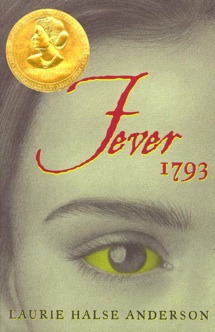Fever 1793 Vocabulary

Chapter 1
stays and shift;
stay-noun Chiefly British. A corset.
shift-noun Clothing.
a. a straight, loose-fitting dress worn with or without a belt.
b. a woman’s chemise or slip.
“I fastened my stays and a badly embroidered pocket over the white shift I slept in.”
Chapter 2
dosed; –verb to treat with an application or agent.
“You should be dosed with fish oil”
victuals; –noun food or provisions for human beings.
“If not for Eliza’s fine victuals, and the hungry customers who paid to eat them, we’d have been in the streets long ago.”
supped; –noun to take in small mouthfuls
“They both supped sorrow with a big spoon, that’s what Mother said.”
pestle; –noun a tool for pounding or grinding substances in a mortar.
“Nutmeg and cinnamon perfumed the air as she ground the spices with a pestle.”
Chapter 4
miasma; -noun a dangerous, foreboding, or deathlike influence or atmosphere.
“It’s a source of a deadly miasma, a foul stench, indeed.”
bilious; -adjective suffering from, caused by, or attended by trouble with the bile or liver.
“Mary Shewall died soon after of a bilious fever, and one could hardly fault her character.”
Chapter 5
liebchen; -noun German for sweetheart.
“How many eggs do you want, liebchen?”
demure; -adjective characterized by shyness and modesty; reserved.
“I would fish like a lady, with good posture and a demure manner.”
Chapter 6
mangle; –noun a machine for smoothing or pressing clothes, household linen.
“Grandfather watched from the shade as I cranked the wheel of the mangle.”
Chapter 8
almshouse; –noun Chiefly British. a house endowed by private charity for the reception and support of the aged or infirm poor.
“Isn’t that why we have an almshouse?” asked Grandfather.
pestilence; -noun a contagious or infectious epidemic disease that is virulent and devastating.
“I tell you, William, men who stood unafraid before British cannon run in fear from this foul pestilence.”
Chapter 9
dittany; –noun a Cretan plant, Origanum dictamnus, of the mint family, having spikes of purple flowers and formerly believed to have medicinal qualities.
“She was supposed to drink dittany tea sweetened with molasses, but it tasted too terrible.”
Chapter 10
jalap and calomel;
“She’ll need ten grains of jalap and ten grains of calomel.”
jalap; noun a twining eastern Mexican vine having tuberous roots that are dried, powdered, and used medicinally as a cathartic.
calomel; – noun a white, tasteless powder, used chiefly as a purgative and fungicide.
cajoling; -verb to persuade by flattery or promises.
“No amount of cajoling would change her mind.”
Chapter 13
brambles; -noun a prickly shrub or bush.
“I kicked the rock deep into the brambles.”
Chapter 14
slovenly; -adjective untidy or unclean in appearance or habits.
“He fired the slovenly devils who cause all the trouble.”
Chapter 15
destitute; -adjective without means of subsistence; lacking food, clothing, and shelter.
“They told of good people who refused to take any money for helping strangers, even though they themselves were poor and destitute.”
impudence; -noun the quality of being offensively bold.
“I shall report your impudence to the president.”
Chapter 16
Potter’s Field; -noun a place for the burial of unknown or indigent persons.
“ ’The Potter’s Field is ahead,’ Mrs. Bowles said as she pointed to the front of the line.”
Chapter 21
wraith; -noun something shadowy and insubstantial.
“You look like a wraith.”
apothecary; -noun one that prepares and sells drugs and other medicines.
“Are you come from the apothecary?”
